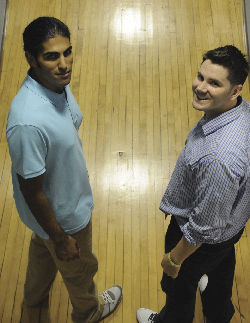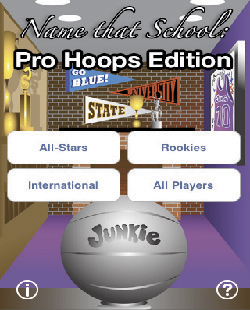Hoop Dreams at TC
Who knew that Clarence "Big House" Gaines went to TC? The story of two friends, an app and some surprising history makes for nothing but -'Net.
One afternoon about a year ago, Peter Robert Casey, at the time
TC's Assistant Director of Student Activities, was looking for an
excuse to avoid getting back to work after his lunch break. He started
clicking around in Pocket Knowledge, the online archive created by TC's
Gottesman Libraries, and stumbled upon a truly momentous fact: Clarence
"Big House" Gaines went to Teachers College.
Just possibly that name may not mean much to you, but to Casey and
others who eat, sleep and breathe sports, especially basketball, Gaines
is the stuff of legend: a Hall of Fame coach who ranks fourth on the
all-time career wins lists; coach and mentor to Earl ("The Pearl")
Monroe; skipper of the first team from a historically black college or
university (Winston Salem State University, where he ran the program
for 47 years) to win the Division II NCAA championship.
Pretty good find for a slow day at work, but Casey wasn't
finished. During the next half hour, he discovered a picture of TC's
women's basketball team, circa 1896--just five years after the sport
was invented (they used to play on the fourth floor of Thompson, in the
gym that has since been carved up into offices). He also learned that
two other Hall of Fame college coaches were TC grads: Howard "Hobby"
Hobson, whose 1939 University of Oregon squad won the very first NCAA
championship (when the National Invitational Tournament was the bigger
deal; but Hobson then went on to a stellar career at Yale and served on
the U.S. Olympic Committee); and the real stunner: the late Adolph
Rupp, long-time head coach at the University of Kentucky, third on the
career wins list, holder of four NCAA championships, and--most
memorably--coach in the 1966 NCAA championship game that pitted his
all-white starting five against upstart Texas Western, whose five
starting players were African American. Texas Western won that game,
which has been immortalized in the movie Glory Road, by a score of
72--65.
Most sports junkies would have been content to go home and brag to
their friends--but Casey, who received his TC master's in
Organizational Psychology in 2008, is not your average sports junkie.
At the time, he was becoming well known in cult circles for
microblogging via Twitter courtside from the home games of his favorite
childhood team, St. John's. He discovered after further clicking that
Clarence Gaines' son, Clarence, Jr., a former NBA scout, is alive and
well in southern California. He called Gaines, Jr., and they talked for
an hour. Among other things, Casey learned that Gaines, Sr., like many
other black educators of his era, had come to TC because southern
schools were closed to black students. He also learned that Rupp, who
was often portrayed as a racist, coached racially integrated high
school teams before coming to Kentucky.
But this is only partially a story about TC's basketball history.
It's also a tale of technology, friendship, entrepreneurial spirit,
life in the Big Apple, and the creative uses to which one can put a
Teachers College degree.
In spring 2009, Nabeel Ahmad was waiting to enter Riverside Church
for TC's doctoral hooding ceremonies. By alphabetical happenstance,
Ahmad, who was receiving his doctorate in educational technology, was
first on line, and he fell to chatting with the guy in charge of
wrangling his group--Peter Casey. They'd never spoken before, but
quickly discovered their mutual love of basketball. Eventually, they
remembered seeing each other the previous summer in the stands at the
Entertainer's Basketball Classic at Rucker Park in Harlem, where New
York City schoolyard legends battle NBA superstars.
"We were talking and noted that many people at TC have an interest
in sports, so we should do something with it," Ahmad recalls. "Although
I was on my way out, Peter said, let's keep in touch."
As it turned out, Ahmad ended up coming back to TC as an adjunct
assistant professor in the Math, Science and Technology Department. (He
teaches two courses on the use of mobile phones and other handheld
devices as an educational tool.) He, Casey and Aly Somani, another
recent TC grad who worked for the NBA Players Association at the time,
collaborated to create--what else?--an iPhone sports trivia app called
Junkie Status. TC alumni Ian Toledo, a graphic artist, and, Pranav
Garg, a programmer and staff member of the Gottesman Libraries EdLab
group, worked with the team to create the app.
Junkie Status (http://junkiestatus.com), which can be downloaded
for 99 cents (one percent is given to charity), differs from other
sports trivia quizzes on two counts. Instead of typical questions that
takes a few seconds to process--"Who led the NBA in scoring in
1975?"--it poses chains of questions that, in a modest way, seek to
educate. For example: "Which school did Shaquille O'Neal attend?" A
"shot clock" ticks while you ponder your answers, and the app responds
with a rousing "Swish!" for a correct answer and "Air ball!" for a
miss, along with the correct answer (Louisiana State University). You
can then read a fun fact about the player in question (e.g., O'Neal has
released four rap albums, with his first going platinum), before moving
on to the next puzzler.
Also, Junkie Status, as its name suggests, rates users'
performances rather than simply keeping a log of the highest user
scores.
"Normally, you tell people, 'I got 10,000 points,' or 'I'm number
one on the list,' but how can you prove it?" says Ahmad. "Our app gets
away from scores. You get a percentage rating based on the number of
right answers. So if you get 7 of 10 correct, your Junkie Status is 70
percent." The percentages are accompanied by fun graphic images-'"a
patient in a basketball-themed hospital bed if you score a lowly 40
percent; the patient using a walker if you do a little better; and so
on. Players can try to achieve the elusive 100 percent Junkie Status in
four categories of play: All Stars, Rookies, International and All
Players.
But, of course, bragging rights are still what it's all about--so
Junkie Status thoughtfully provides users with links to Facebook and
Twitter so that they can immediately notify their personal social
networks of their ratings (with the fun graphics included). "We let
users leverage their own social networks instead of trying to create
our own," Casey says.
Junkie Status launched in June and is selling briskly, according
to Ahmad. Casey, Ahmad and their colleagues are now working on similar
apps for football and other sports.
"We're trying to be like smart coaches and think two steps ahead,"
Ahmad says. "The app development isn't much work once you've completed
the first one. The time-consuming part is researching all the trivia
questions."
Meanwhile, Ahmad and Casey are working on what potentially is a
much bigger product: a Web-based personnel management application
called Team Chemist (http://www.theteamchemist.com) that will enable
NBA general managers to evaluate players they're thinking about
acquiring in trades or via free agency.
"We've studied players' personalities and past behavior to
determine what situations and roles allow them to perform at their
best, and we've built that information into an online tool to help GMs
make better decisions," Casey says. "This information is almost
entirely in the public domain--editorials, interviews players have
done, updates they've posted on Facebook and Twitter. What you find is
that, for example, while nearly all NBA players were standouts at the
high school and college levels, not all helped their teams to win.
Whereas a guy like Dwyane Wade [now with the Miami Heat] took a
mediocre Marquette team all the way to the Final Four. So we're not
interpreting anything, we're just aggregating."
"If you're making a multi-million dollar hiring decision, would
you want to know everything you can about the person in question?"
Ahmad asks. "You would be surprised how little information GMs base
their decisions on. Our goal is to fix that."
In July, Ahmad, Casey and David Guralnick--also an Adjunct
Assistant Professor of Technology & Education at TC, and originator
of the Team Chemist concept--attended the annual NBA Summer League in
Las Vegas. They got some promising nibbles from people in several
organizations, including the New York Knicks.
"Many of us grew up obsessed with sports," Ahmad says. "My brother
collected every issue of Sports Illustrated and local newspaper's
sports section for ten years. My mother and I used to give him a hard
time about it and tell him how useless it was. But maybe it wasn't so
useless after all."
Published Wednesday, Sep. 15, 2010

